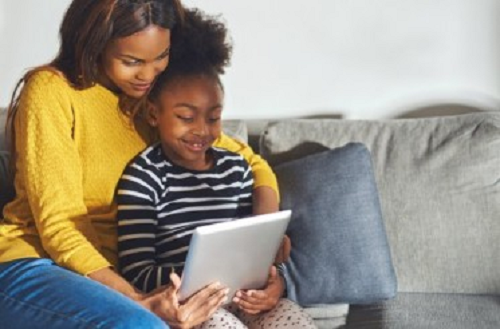
Screen time and children
These days it is not uncommon to see babies and toddlers busy on devices such as TVs, tablets and phones. Children enjoy watching TV, playing on tablets, phones and computers.
They find them entertaining and can spend hours on them. They know how to operate these devices without being taught. Some children use it in place of interaction.
Advertisement
In some situations, these children have had to be prompted by their parents to pause whatever they are doing on their phones or tablets to greet or say ‘hello’ to adults.
It can be quite embarrassing to family members. COVID-19 made the situation of longer periods on devices worse.
Children were stuck home for months and were introduced to online learning, making the time spent on screens even longer.
In addition, play has become screen-based these days.
According to the new World Health Organisation (WHO) guidelines, babies and toddlers should not be left to passively watch TV or other screens.
Socialising with other children, reading books, running around and screen time are all opportunities for children to play. It’s important that the time allotted in a day for all these are monitored.
When used appropriately, screen time can be useful and educational.
Impact, screen time
What benefits do children get from screen time? One study reports that toddlers who were exposed to more screen time were more likely to have delayed expressive language.
The use of electronic devices before one goes to bed can make it harder to fall or stay asleep.
However, as mentioned earlier, when these devices are used appropriately, children can gain some benefits.
Effective use
• Limit screen time to at least 30 minutes a day for under 2s and an hour for 3-5 year olds.
• Watch TV together with your child. Do not leave child to watch it alone (passively watching screen).
• Use the screen time as an opportunity for interaction. Talk about what is happening when they are playing on the device or watching a video. For example, ‘The dog is jumping’ or ‘This is a big cat’.
• Use your phone or any other device to take photos of your child doing an activity. Engage your child in an interaction about what they were doing. For example, ‘I took a photo of you cooking, what were you cooking?’
• Watch videos of nursery rhymes together with your child and sing along by copying the actions for your child to imitate. It helps your child understand action words (verbs such as jump, run etc. and identify words such as body parts i.e. nose, head, etc.
• Higher level skills such as making predictions and inferences can be developed from watching something together and asking questions such as ‘What do you think will happen next?’ and ‘Why do you think she is not happy’
• Turn off the TV, tablets and phones when no one is watching to avoid background noise. Background noise can distract children, as well as adults from listening when being spoken to.
• Make bedrooms a no-screen zone to help children get a better night sleep. Make the last hour before sleeping a time for engaging your child in stories rather than watching a screen.
In order for screen time to be beneficial to children, they should be used to help engage them in language-filled interactions.
This will help with vocabulary development and learning of new and vital interactional skills.
The writer is a Speech & Language Therapist/Clinical Tutor. University of Ghana.



